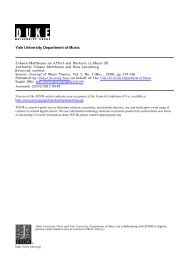Après une Lecture de Liszt: Virtuosity and ... - Free
Après une Lecture de Liszt: Virtuosity and ... - Free
Après une Lecture de Liszt: Virtuosity and ... - Free
Create successful ePaper yourself
Turn your PDF publications into a flip-book with our unique Google optimized e-Paper software.
19THCENTURYMUSICformal coherence ascribes the unity of a performancenot to the origin of the performance (atext or a sketch) but to its <strong>de</strong>stination. Thelistener qua <strong>de</strong>stination becomes a space inwhich a dazzling multiplicity of rhetorical effectscan con<strong>de</strong>nse into a “work.” But such awork remains a text without an inscription,irrespective of whether the improvising performer(after Czerny) or the able listener (afterGollmick) is held to be the agent of cohesion. 46With its implicit emphasis on <strong>de</strong>stination,Czerny’s textbook <strong>de</strong>finition expounds a synonymybetween “Fantasieren,” “Improvisieren,”<strong>and</strong> “Extemporieren,” although the lattertwo terms are largely dropped for the remain<strong>de</strong>rof the treatise. 47 While Czerny explainsmethods practicing improvisation in differentstyles, with different types <strong>and</strong> numbers ofthemes, <strong>and</strong> even with different audiences inmind, he offers no discussion of formal organizationexcept as it is <strong>de</strong>termined by the themes<strong>and</strong> their strategically varied appearances. Inother words, Czerny’s emphasis is on the thematicinvention of the moment rather than onany premeditated <strong>de</strong>sign. Of course, this resultedin formal organization of a kind, although“in a much freer form than a written work,” forCzerny emphasized the listener qua <strong>de</strong>stinationby insisting that an improvisation “mustbe fashioned into an organized totality [only] asfar as is necessary to remain comprehensible<strong>and</strong> interesting.” 48In two separate critiques of Czerny’s treatise,Hamburg’s Blätter für Musik und Literaturquestioned whether a “systematic” approachto improvisation might ren<strong>de</strong>r a free Fantasy“only a piece [Musikstück] falling un<strong>de</strong>r the46The mo<strong>de</strong>l for shifting the locus of meaning from originto <strong>de</strong>stination comes from Barthes, “The Death of theAuthor,” which empowers the agency of the rea<strong>de</strong>r postmortem. Barthes, “The Death of the Author,” p. 148.47Like Czerny, Hummel appears to regard “Phantasiren”<strong>and</strong> “Extemporiren” as synonymous in his Clavierschule;although he uses the term “Phantasiren” only in the text,the title of his seventh chapter from volume 3 is given as:“Vom freien Phantasiren. (Extemporiren).” See Hummel,Ausführliche theoretisch-practische Anweisung zumPiano-Forte-Spiel, vol. 3 (Vienna: Tobias Haslinger, 1828),p. 444.48“Obschon in viel freyeren Formen, als eine geschriebene,doch in soweit ein geordnetes Ganzes bil<strong>de</strong>n muss, alsnöting ist, um verständlich und interessant zu bleiben”(Czerny, Systematische Anleitung, p. 3 [Michell, p. 1]).h<strong>and</strong>s ex tempore.” 49 Similarly an anonymousViennese critic drew a distinction betweenImprovisieren/Extemporieren, <strong>and</strong> Phantasieren,arguing that the terms should differentiatethe levels of formal coherence in an improvisation.Whereas Phantasieren was essentially unboundfrom prior conceptions of form, the othertwo expressions: “connote simply the fusion ofinvention <strong>and</strong> formal realization”—that is, theyrelate to recognizably “composed” forms: “Onecan improvise a regular sonata, an overture, astrict fugue etc. This, however, cannot be calleda “Fantasie” by any means.” 50A review of <strong>Liszt</strong>’s earliest public improvisation—datingfrom his tutelage un<strong>de</strong>r Czerny—records a similar differentiation. The elevenyear-old’sViennese <strong>de</strong>but took place on 1 December1822, <strong>and</strong> his concluding “free fantasy”performance at this concert elicited a correctivein the Allgemeine Zeitung: “We shouldprefer to call the fantasy a ‘capriccio,’ for severalthemes united by voluntary passages donot <strong>de</strong>serve that magnificent title, too often49“Und die freie Phantasie ist jetzt nur ein unter <strong>de</strong>nHän<strong>de</strong>n gesetztes Musikstück ex tempore” (Christern,“Vom musikalischen Phantasie,” Blätter für Musik undLiteratur 4 [Oct. 1840], 21–22, here 21).50The full comment reads: “We regard the expressionsFantasieren, <strong>and</strong> subsequently Improvisieren <strong>and</strong>Extemporieren, however, not quite as synonymous as theauthor suggests, rather we hold that the latter two expressionsconnote simply the fusion of invention <strong>and</strong> formalrealization, whereas in the concept of ‘Fantasie’ the powersof the imagination predominate over form so that, inthe latter, the artist immediately lends form to i<strong>de</strong>as whichhis mood, enthusiasm <strong>and</strong> inventiveness have just inspired,<strong>and</strong> he only follows formal requirements in so far as theyare essential for an artistic creation. One can improvise aregular sonata, an overture, a strict fugue etc. This, however,cannot be called a ‘Fantasie’ by any means.” (Wirhalten die Ausdrücke Fantasieren, dann Improvisieren undExtemporieren jedoch nicht so ganz gleichbe<strong>de</strong>utend, wiediess <strong>de</strong>r Verfasser [Czerny] an<strong>de</strong>utet, son<strong>de</strong>rn glauben,daß die bei<strong>de</strong>n letzen Ausdrücke nur das gleichzeitigeZusammentreffen <strong>de</strong>r Erfindung mit <strong>de</strong>r Ausführungbezeichnen, daß aber im Begriffe <strong>de</strong>r Fantasie auch dasVorherrschen <strong>de</strong>r Einbildungskraft über die Form liegt, so,daß in <strong>de</strong>r letzteren <strong>de</strong>r Künstler I<strong>de</strong>en, welche seine La<strong>une</strong>,Begeisterung, und Erfindungsgabe ihm eben eingibt,sogleich ausführet, und die Formen nur soweit beachten,als sie zu einer Kunstleistung <strong>une</strong>rläßlich, sind. Man kanneine regelmäßige Sonate, eine Overtüre, eine strenge Fugeu.s.w. improvisieren. Allein diess nennt man noch keineFantasie.) (“Über die systematische Anleitung zumPhantasieren auf <strong>de</strong>m Pianoforte con Carl Czerny,” Monatbericht<strong>de</strong>r Gesellschaft <strong>de</strong>r Musikfreun<strong>de</strong> <strong>de</strong>s ÖsterreichischenKaiserstaates [1830]).64



